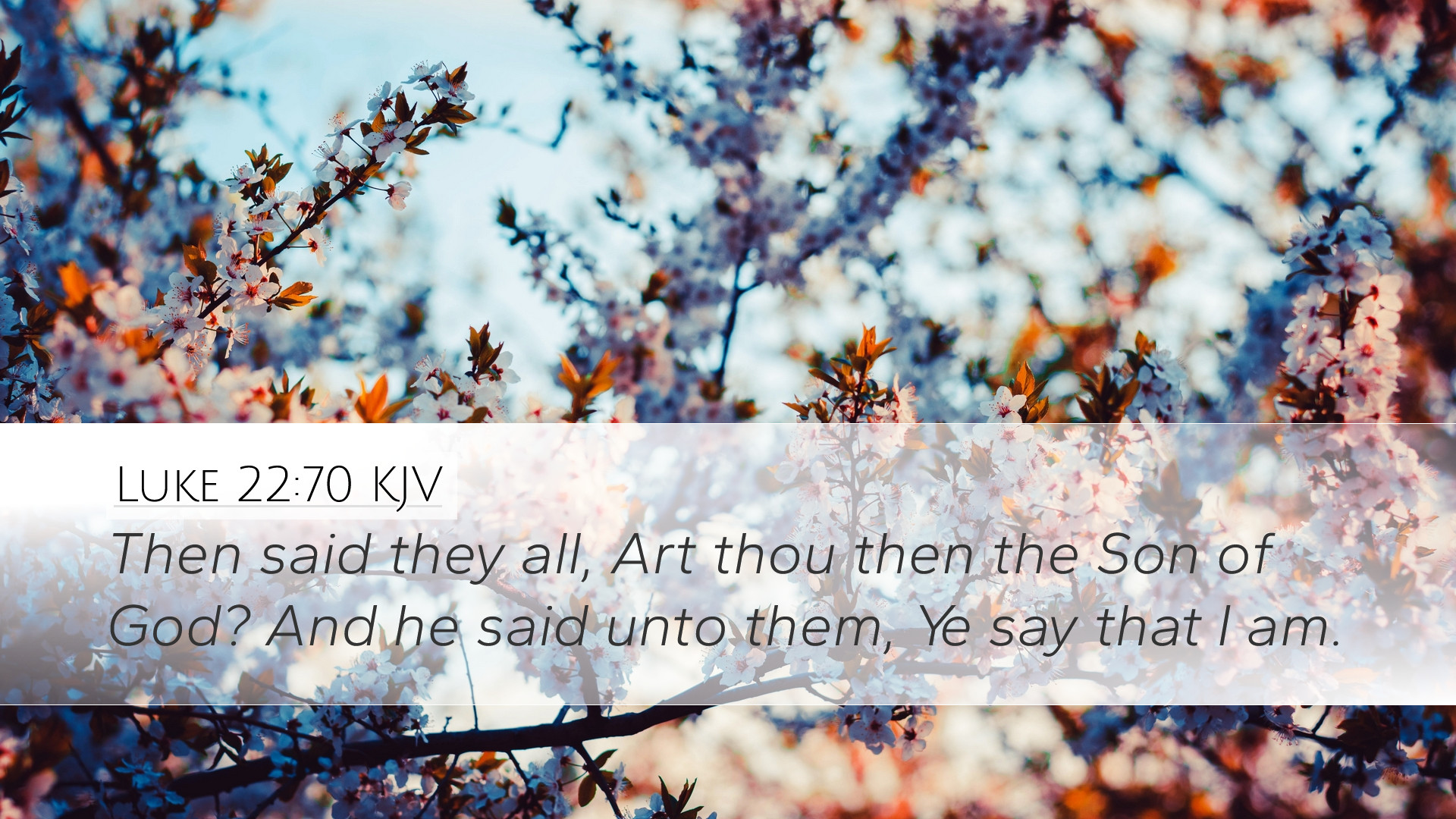Commentary on Luke 22:70
Luke 22:70 states, "Then said they all, Art thou then the Son of God? And he said unto them, Ye say that I am." This verse occurs during the interrogation of Jesus, and it is crucial for understanding both His identity and the reactions of those questioning Him.
Contextual Overview
This verse is situated in a pivotal moment just before Jesus’ crucifixion. The High Priest and the council of the Jews are questioning Jesus regarding His identity, particularly His claim to be the Messiah. This questioning is not merely an inquiry but a culmination of their opposition against Him throughout His ministry.
Jesus’ Affirmation of His Identity
In this response, "Ye say that I am," Jesus acknowledges their question but also places the responsibility of the assertion back on them. This answer is multifaceted:
- Recognition: Jesus recognizes the title they attribute to Him, asserting that it is true in its essence, but invites them to understand it deeply.
- Challenge: By stating "Ye say that I am," He challenges their perception of the Messiah, which they have misconstrued from their expectations of a political savior.
- Divine Clarity: This response may also suggest that true understanding of His status as the Son of God is not merely verbal acknowledgment, but spiritual insight into His nature as the true Messiah.
Commentary Insights
Matthew Henry
Henry remarks on the boldness required for Jesus to declare His divine sonship under such hostile questioning. He explains that this moment reveals the heart of the Gospel—that Jesus is indeed the Son of God and emphasizes the blasphemy that the Jewish leaders are about to commit against Him.
Albert Barnes
Barnes elaborates on the theological implications of Jesus’ acknowledgment of being the Son of God. He refers to the significance of this title within the Jewish context and notes that it carries immense weight regarding Jesus' authority and mission. Barnes insists that the leaders’ unwillingness to accept Christ as the Messiah underscores their spiritual blindness.
Adam Clarke
Clarke dives deeper into the implications of this confrontation, highlighting comments on how the acknowledgement of Jesus as the Son of God brings forward the duality of faith and blasphemy present in this moment. He suggests that the question posed to Jesus indicates a desperate attempt to discredit Him, reflecting the inner turmoil of the Jewish leaders facing the truth of Jesus’ identity.
Theological Implications
Each commentary provides valuable insights into several core theological elements surrounding this verse:
- Christology: This verse is significant in the study of Christ’s nature, reinforcing His divine sonship as foundational to Christian belief.
- Authority of Jesus: The interchange suggests that while others questioned His authority, Jesus stood firm, embodying truth against the falsehood of man-made doctrines.
- Messianic Expectations: The leaders’ failure to recognize Jesus as the true Messiah demonstrates a critical disconnect rooted in their preconceptions and traditions.
Applications for the Faithful
For pastors, students, theologians, and Bible scholars, this passage invites reflection on several levels:
- Defending One's Faith: Just as Jesus defended His identity, the faithful are called to articulate their understanding of Christ in a world that often questions His relevance and truth.
- Awareness of Misconceptions: The challenge posed in this discourse encourages believers to examine their own understandings of who Jesus is and how they express that in their lives.
- Encouragement in Persecution: Jesus’ unwavering declaration during adversity inspires believers to maintain their faith amid challenges and opposition.
Conclusion
Luke 22:70 serves as a cornerstone in the narrative of Jesus's trials leading up to crucifixion. The question of His identity reverberates through centuries, calling every generation to ponder the vital question: "Who do you say that I am?" This verse not only affirms the central tenet of Christian faith but also invites deeper exploration into one’s understanding of Christ.


